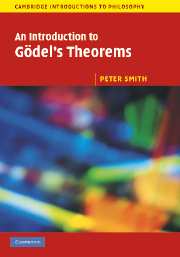Book contents
- Frontmatter
- Contents
- Preface
- 1 What Gödel's Theorems say
- 2 Decidability and enumerability
- 3 Axiomatized formal theories
- 4 Capturing numerical properties
- 5 The truths of arithmetic
- 6 Sufficiently strong arithmetics
- 7 Interlude: Taking stock
- 8 Two formalized arithmetics
- 9 What Q can prove
- 10 First-order Peano Arithmetic
- 11 Primitive recursive functions
- 12 Capturing p.r. functions
- 13 Q is p.r. adequate
- 14 Interlude: A very little about Principia
- 15 The arithmetization of syntax
- 16 PA is incomplete
- 17 Gödel's First Theorem
- 18 Interlude: About the First Theorem
- 19 Strengthening the First Theorem
- 20 The Diagonalization Lemma
- 21 Using the Diagonalization Lemma
- 22 Second-order arithmetics
- 23 Interlude: Incompleteness and Isaacson's conjecture
- 24 Gödel's Second Theorem for PA
- 25 The derivability conditions
- 26 Deriving the derivability conditions
- 27 Reflections
- 28 Interlude: About the Second Theorem
- 29 µ-Recursive functions
- 30 Undecidability and incompleteness
- 31 Turing machines
- 32 Turing machines and recursiveness
- 33 Halting problems
- 34 The Church–Turing Thesis
- 35 Proving the Thesis?
- 36 Looking back
- Further reading
- Bibliography
- Index
19 - Strengthening the First Theorem
Published online by Cambridge University Press: 05 June 2012
- Frontmatter
- Contents
- Preface
- 1 What Gödel's Theorems say
- 2 Decidability and enumerability
- 3 Axiomatized formal theories
- 4 Capturing numerical properties
- 5 The truths of arithmetic
- 6 Sufficiently strong arithmetics
- 7 Interlude: Taking stock
- 8 Two formalized arithmetics
- 9 What Q can prove
- 10 First-order Peano Arithmetic
- 11 Primitive recursive functions
- 12 Capturing p.r. functions
- 13 Q is p.r. adequate
- 14 Interlude: A very little about Principia
- 15 The arithmetization of syntax
- 16 PA is incomplete
- 17 Gödel's First Theorem
- 18 Interlude: About the First Theorem
- 19 Strengthening the First Theorem
- 20 The Diagonalization Lemma
- 21 Using the Diagonalization Lemma
- 22 Second-order arithmetics
- 23 Interlude: Incompleteness and Isaacson's conjecture
- 24 Gödel's Second Theorem for PA
- 25 The derivability conditions
- 26 Deriving the derivability conditions
- 27 Reflections
- 28 Interlude: About the Second Theorem
- 29 µ-Recursive functions
- 30 Undecidability and incompleteness
- 31 Turing machines
- 32 Turing machines and recursiveness
- 33 Halting problems
- 34 The Church–Turing Thesis
- 35 Proving the Thesis?
- 36 Looking back
- Further reading
- Bibliography
- Index
Summary
We now start exploring further around and about our incompleteness theorems. But do be careful! Don't let the developments over these next three chapters obscure the relatively simple lines of the classic Gödelian arguments which we have already given in Chapters 16 and 17.
The main business of this chapter is to present two key ways of strengthening our incompleteness theorems.
We show how to extend the reach of both the semantic and syntactic versions of our incompleteness results, so that they apply not just to p.r. axiomatized theories, but to any formal theory that counts as axiomatized in the intuitive sense. (We also draw an easy corollary of our newly extended semantic theorem, and prove that the truths of basic arithmetic can't be axiomatized.)
We explain how we can do away with the assumption of ω-consistency (as used in Gödel's original First Theorem): we can prove that any nice theory is incomplete and incompletable, whether it is?-consistent or not. That's the Gödel-Rosser Theorem.
Then, after the main business, we explain another way of weakening the assumption of ω-consistency, this time involving the idea of so-called ‘1-consistency’.
Broadening the scope of the incompleteness theorems
Our intuitive characterization of a properly formalized theory T requires various properties like that of being an axiom of T to be effectively decidable. Or, what comes to the same given a sensible Gödel numbering scheme, the characteristic functions of numerical properties like that of numbering a T-axiom should be effectively computable (see Sections 3.3 and 11.6).
- Type
- Chapter
- Information
- An Introduction to Gödel's Theorems , pp. 162 - 168Publisher: Cambridge University PressPrint publication year: 2007



